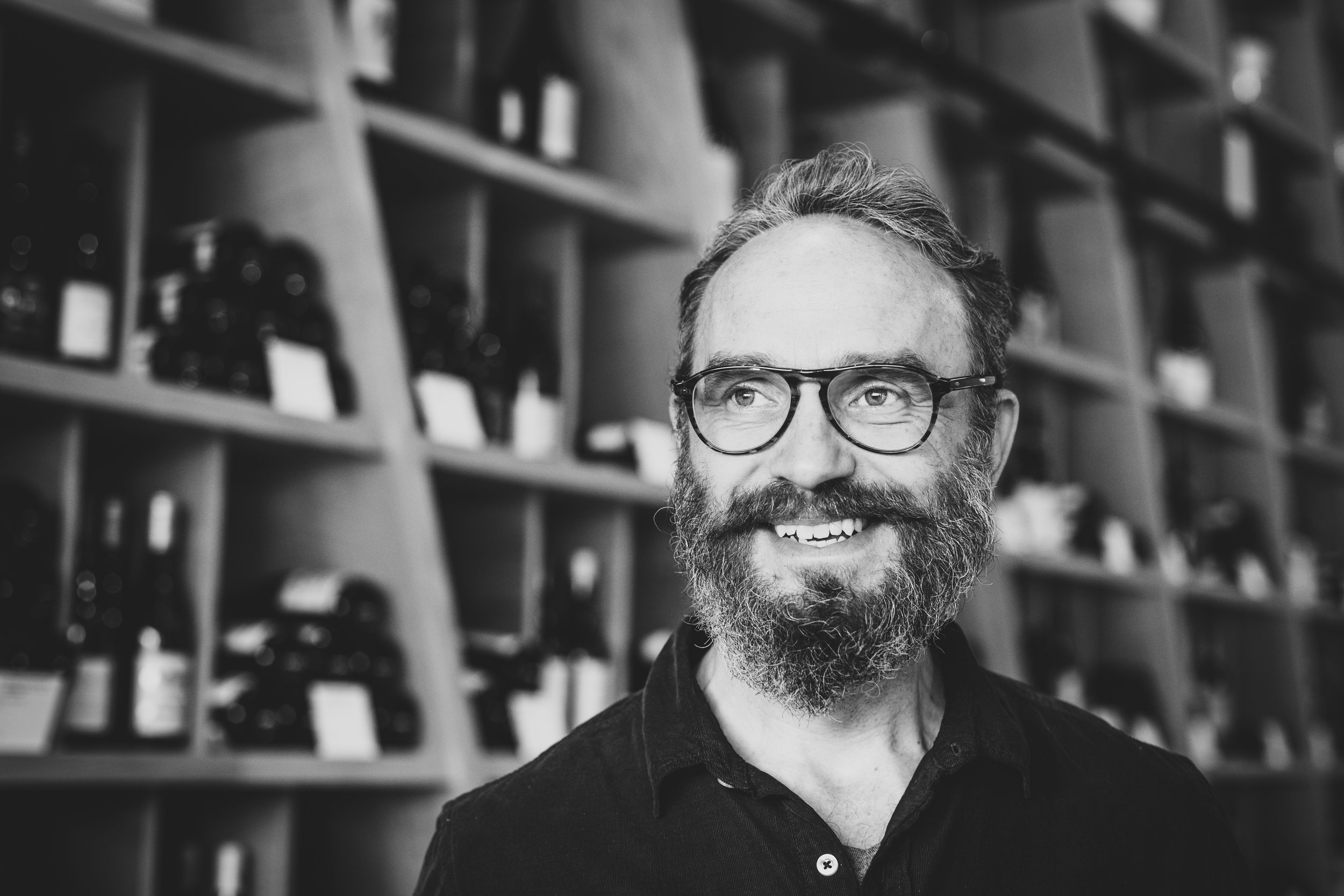John Stanley (Stanley's Wet Goods) : Interview 33
John Stanley is the proprietor of Stanley's Wet Goods in Culver City, California. With this project, John shares his love of the artisanship and complexities within the wine, beer, and spirits communities, while providing a space to relax, taste, and purchase a wide range of products. We met at his shop on Venice Boulevard and chatted about the ups and downs of love, growing up as an adult, and gaining perspective after perceived failure.
Meet John.
WHAT IS YOUR GREATEST FEAR?
I’m afraid of letting my wife down. She’s been an enormous supporter. I’m confident that she’s going to love me no matter what, and if this project [Stanley’s Wet Goods] were to fail or somehow things didn’t turn out as we had hoped, we’re still going to travel through this life together, so that’s very, very comforting. It’s fun to have aspirations, so being able to deliver on some of the promise that we see for each other is super important.
HOW DO YOU DEFINE BEING “IN LOVE”?
I think it’s less a feeling than an act. It’s really committing time and effort to a relationship. Sometimes when it’s not so easy to do, and maybe it’s not the most fun time in life, but that’s when the love really comes out. You have to be there. And sometimes say the tough things that constitute love; setting people straight when you need it. That’s part of loving, too. In general, it’s being supportive no matter what, being there, showing up.
Every relationship has its ups and downs and there have been times when one of us has felt, “I’m not getting the respect that I deserve out of you. What’s going on here?” So being able to talk through that and have the person on the other end go, “Oh, you know, you’re right. I’ve been a real jerk about it and here’s what I need to change or else I’m on shaky ground here.” Once you realize the entire relationship isn’t just a foregone conclusion… [Laughter]
STEVE: That’s an excellent way to put it.
JOHN: …you realize it requires tending all the time and you have to keep working at it. Those are the crucial moments when you really find out what people are made of. But it’s ultimately being able to listen and then change what the heck you’re doing. It’s really tough sometimes.
STEVE: Listening and changing. You have to be conscious to do that. Maybe I’m not doing what I should be, maybe I’m making poor decisions, but it’s hard to hear that. But it’s nice to have someone who can kick your ass every once in a while.
JOHN: Yeah! That’s half of it.
WHAT DOES FAILURE LOOK LIKE TO YOU?
I’ve had things that I’ve attempted to do previously in my life that I was super passionate about and they just didn’t turn out the way I thought they were going to. At the time I felt like a huge failure, but you get some space from those, quote unquote, failures and you realize that going through that experience was very beneficial and was a life-changing thing.
So just because it didn’t turn out the way you wanted it to, it doesn’t necessarily mean that it’s really, in the end, a failure. It doesn’t take away the pain in that moment, it sucks! [Laughter] You’re thinking, “I really thought I could deliver on this. What the hell happened?” So that’s, again, tough. And at the time, there’s no other way to feel about it other than I failed. Again, you get some perspective later on. It got me to where I am today, is how I look at things. Life’s got all these weird twists and turns. One door closes and another one opens.
WHAT’S ONE THING YOU DON’T KNOW NOW, BUT FEEL COMPELLED TO KNOW BEFORE YOU DIE?
It’s sort of never-ending! [Laughter] How to really live at peace with yourself and the community of people you have around you. That’s a never-ending quest. When I was younger, I would go on these tangents in terms of thinking about what’s an honorable way to live a life, and sometimes it’s tantalizing to look at these monks up in Tibet, in the East, and they’ve got it all figured out and they’re so happy all the time…but you try to apply that—at least for me—I don’t know if that’s really practical.
Everybody has their own path in life, and growing up in a Western society, you just need to own your history and heritage, your own personal upbringing, and be like, “Well, that’s great for that person, but it’s not going to work for me.” But to answer your question, the thing I need to know or learn about is how to craft a life that is best for me.
STEVE: What are some ways you try to do that?
JOHN: First and foremost, I just try to live a principled life. If there are these principles that you can live by and stand by and don’t waver from them, that goes a long way. And beyond that, it’s a balance. Everything about life, including wine, is about balance. You need to, sometimes, have these fantastic detailed plans that you execute and make sure every day, you’re working towards that plan. And some days you just need to cut loose and forget about the plan and have fun; improv.
“If there are these principles that you can live by and stand by and don’t waver from them, that goes a long way. And beyond that, it’s a balance. Everything about life, including wine, is about balance. You need to, sometimes, have these fantastic detailed plans that you execute and make sure every day, you’re working towards that plan. And some days you just need to cut loose and forget about the plan and have fun; improv.”
WHAT WILL YOU MISS THE MOST WHEN YOU’RE GONE?
Is there anything to miss when you’re gone? You’re gone, right? [Laughter] I don’t count on anything after this life. I’m not saying it doesn’t exist, but I don’t count on it. If something’s there, then that’s fantastic. But I don’t count on it, therefore I don’t think about what I would miss because if I can think about that I’d rather just do it now. Enjoy it now.
Part of that balance is living in the moment, so if there’s something you want to enjoy that you think you might miss later on, you better do it now.

